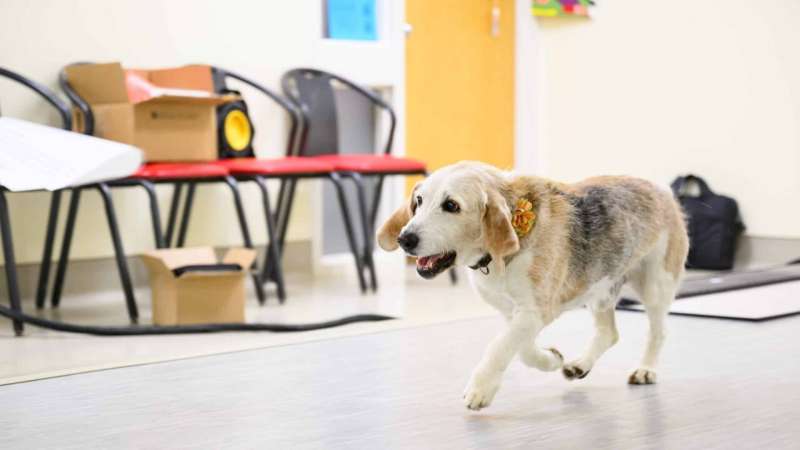Slow walking could be sign of dementia in older dogs

Dogs who slow down physically also slow down mentally, according to a new study from North Carolina State University. Measuring gait speed in senior dogs could be a simple way to monitor their health and to document decline in their neurological function as they age.
“Walking speed in people is strongly associated with cognitive decline,” says Natasha Olby, Dr. Kady M. Gjessing and Rahna M. Davidson Distinguished Chair in Gerontology at NC State and corresponding author of the study published in Frontiers in Veterinary Science. “We hypothesized that the same might be true in dogs.”
Olby and her colleagues measured gait speed off leash in 46 adult and 49 senior dogs. The adult dogs, who served as a control group, only had their gait speed measured. The senior dogs did some additional cognitive testing and their owners filled out a cognitive assessment questionnaire, called the CADES questionnaire. A higher CADES score indicates more severe cognitive decline.
The senior dogs were grouped together based on their CADES and cognitive testing scores. Individual gait speed was measured first by walking them over a five meter distance on a leash with a handler, then by offering a treat the same distance away from the dogs, and calling them to retrieve it off leash.
“The challenge with measuring gait speed is that dogs tend to match the speed of their handler when on leash, so we measured both on and off leash to see which was the most useful measure,” Olby says.
“Additionally, we are always concerned that body size and limb length will affect gait speed—but if you see a chihuahua and a Great Dane walking together off leash, the shorter one isn’t always behind the other,” Olby continues. “We found that on leash, size does correlate with gait speed, but off leash it doesn’t make a difference. Capturing gait speed off leash lets us see the effects of both physical ability and food motivation.”
The researchers found that in the senior dogs, size didn’t matter when it came to speed; in other words, dogs in the last 25% of their expected life span moved more slowly than adult dogs, regardless of relative size.
“Just as in humans, our walking speed is pretty stable through most of our lives, then it declines as we enter the last quarter or so of our lifespan,” Olby says.
Senior dogs who moved more slowly had more severe levels of cognitive decline based on the owner-completed questionnaires and also did worse on the cognitive testing.
The researchers also found that joint pain did not seem to correlate with walking speed, although they note that there were no dogs with severe osteoarthritis in the program. They hope to address this issue in future work.
“When you look at functional aging, the two most important predictors of morbidity are mobility and cognition,” Olby says. “Mobility relies heavily on sensory input, central processing and motor output—in other words, the nervous system—as a result, mobility and cognition are super interconnected. When you have less mobility, the amount of input your nervous system gets is also reduced. It’s not surprising that walking speed and dementia are correlated.
“For me, the exciting part of the study is not only that we show gait speed correlates with dementia in dogs as in people, but also that the method of testing we used is easy to replicate, since it’s food motivated and over a short distance. It could become a simple screening test for any veterinarian to perform on aging patients.”
More information:
Alejandra Mondino et al, Winning the race with aging: age-related changes in gait speed and its association with cognitive performance in dogs, Frontiers in Veterinary Science (2023). DOI: 10.3389/fvets.2023.1150590
Citation:
Slow walking could be sign of dementia in older dogs (2023, June 27)
retrieved 27 June 2023
from https://phys.org/news/2023-06-dementia-older-dogs.html
This document is subject to copyright. Apart from any fair dealing for the purpose of private study or research, no
part may be reproduced without the written permission. The content is provided for information purposes only.
For all the latest Science News Click Here
For the latest news and updates, follow us on Google News.

